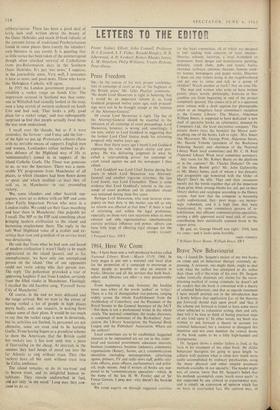1984, Here We Come
SIR,—I have been sent a well-produced booklet called National Library Week : .March 12-19, 1966. In forty pages it sets out a national and local plan for the promotion of a campaign to encourage as many people as possible to take an interest in books, libraries and all the services that both book- sellers and libraries can offer—a very praiseworthy object.
From beginning to end, however, the booklet never uses either of the words 'author' or 'writer.' There is a list of distinguished vice-patrons, ranging widely across the whole Establishment from the Archbishop of Canterbury and the President of the Royal Society to the General Secretary of the NUT ---but there is not a professional writer in the whole clutch. The national committee, the reader discovers, is composed of nominees of the Booksellers' Asso- ciation, the Library Association, the National Book League and the Publishers' Association. Where are the authors?
Local committees are to be established. Suggested interests to be represented are set out in this order: local and national government, education interests, business (commerce), business (industry), community organisations (Rotary, Scouts, etc.), communications specialists (including newspapermen, advertising agents, printers, TV and radio news staff, public rela- tions officers, press officers, parliamentary and politi- cal, trade unions. And if writers of books are sup- posed to be 'communications specialists'--which, in the name of the late H. W. Fowler and of Sir Ernest Gowers, 1 pray not—why doesn't the booklet say so?
We romp eagerly on through suggested activities for the local committees, all of which are designed to link reading with concerns of local interest: libraries, schools, factories, a local battlefield or monument, hook design and manufacture, painting. philately, youth clubs, pubs and hotels, banks.
churches, railways, cinemas, theatres, famous coun- try houses, newspapers and paper works. Discover if there are any writers living in the neighbourhood and get one to come and talk to a group of children? Watch another at work? Not on your life. The men and women who write or have written poetry, plays, novels, philosophy, histories or bio- graphies are from beginning to end of the project completely ignored. The climax of it all is a specimen press release with a draft caption for photographs taken at an imaginary local committee's reception at the County Library. The Mayor, Alderman William Smart, is supposed to have dedicated 'a new shelf of specialist books on cybernetics, donated by Computers Ltd., the local electronics company.' The picture shows (says the booklet) the Mayor auto- graphing one of the books. Left to right: Mrs. Smart (the Mayoress). Mr. George Print, Alderman Smart. Mr. Harold Volume (president of the Booktown Debating Society and chairman of the National Library Week local committee) and Mr. C. H. Reid (National Library Week local committee secretary).
Any room for Mr. Robert Burns on the platform or in the captions? Mr. Charles Dickens? Or one of the three Brontë girls? Mr. John Galsworthy or Mr. Henry James, each of whom a less dynamic and progressive age honoured with the Order of Merit? Don't be silly. They and their successors merely put the words together that all the important chaps print, bind, arrange blurbs for, sell, put on their library shelves and catalogue according to the Dewey system. And now that the computer is becoming really sophisticated, they—poor mugs--are increas- ingly redundant, and it is high time they were transformed, by some compulsory process of re- habilitation, into efficient communications specialists, serving a duly approved social need and, of course. contributing their statistically assessed norm to the export drive.
By gad, sir. George Orwell was right: 1984, here we come—and it looks quite horrible.
7 William Street House, Williath Street. SW1


































 Previous page
Previous page